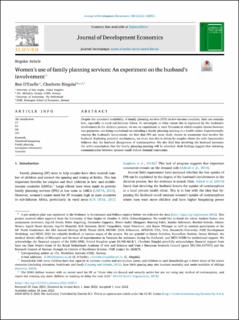Women’s use of family planning services: An experiment on the husband’s involvement
Journal article, Peer reviewed
Permanent lenke
https://hdl.handle.net/11250/3004575Utgivelsesdato
2022-01-01Metadata
Vis full innførselSamlinger
- Publications [1488]
Originalversjon
in Journal of Development Economics vol. 158Sammendrag
Despite the increased availability of family planning services (FPS) in low-income countries, their use remains low, especially in rural sub-Saharan Africa. To investigate to what extent this is explained by the husband’s involvement in the decision process, we use an experiment in rural Tanzania in which couples choose between two payments, one being conditional on attending a family planning meeting at a health center. Experimentally varying the husband’s involvement, we find that FPS are more likely chosen in treatments that involve the husband. Exploring potential mechanisms, we show that this is driven by couples where the wife (incorrectly) believes that the husband disapproves of contraceptives. We also find that involving the husband increases the wife’s expectation that the family planning meeting will be attended. Both findings suggest that initiating communication between spouses could reduce demand constraints.
